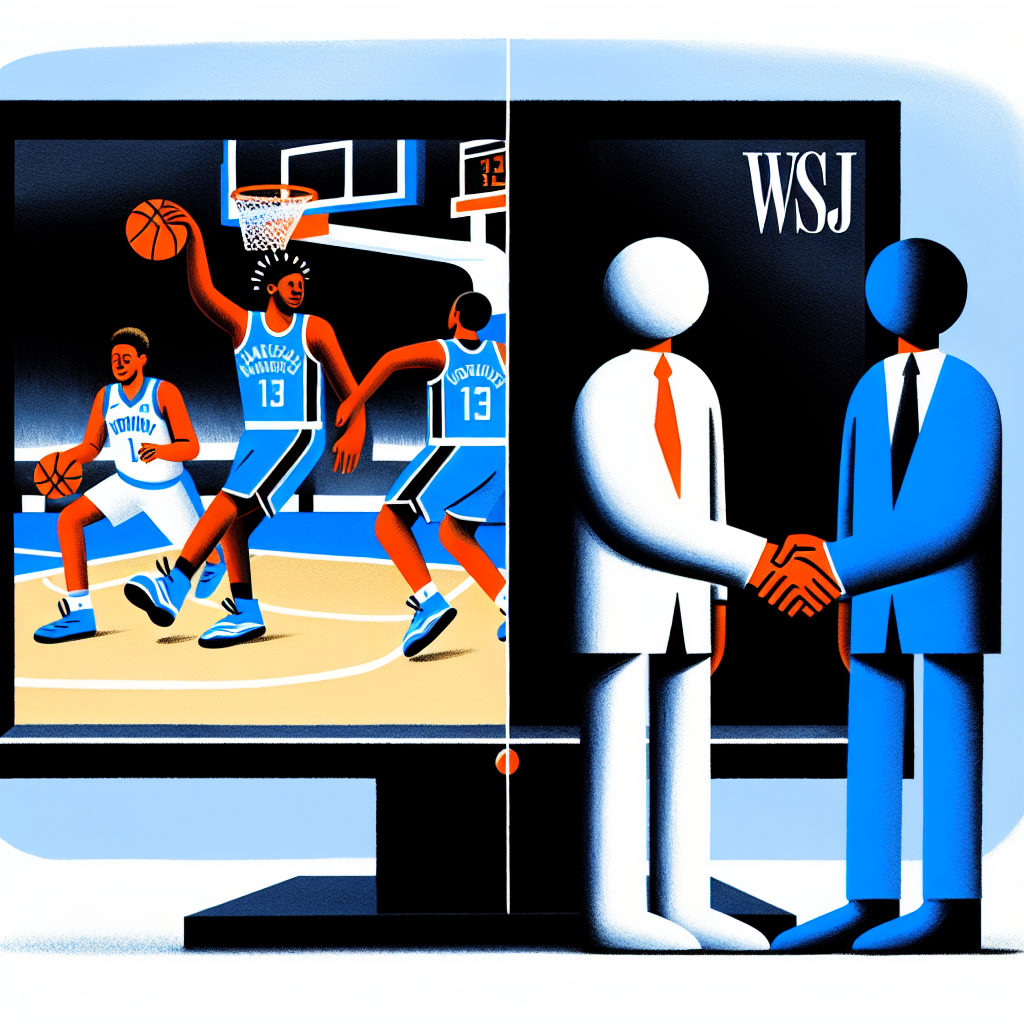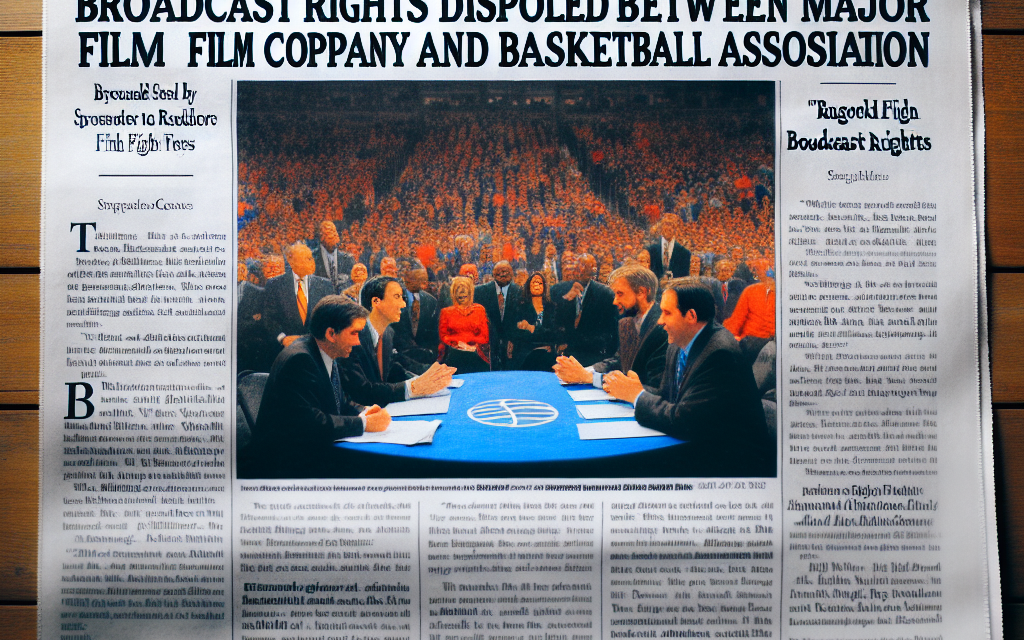“Warner Bros Discovery and NBA: A Slam Dunk Resolution in Broadcast Rights Dispute.”
Introduction
Warner Bros Discovery and the National Basketball Association (NBA) have reportedly resolved a broadcast rights dispute, according to The Wall Street Journal. This resolution marks a significant development in the sports media landscape, as Warner Bros Discovery, a major player in the entertainment industry, secures its position in broadcasting NBA games. The agreement ensures that fans will continue to have access to NBA content through Warner Bros Discovery’s platforms, maintaining the company’s role as a key broadcaster of professional basketball. This settlement highlights the ongoing negotiations and strategic partnerships that shape the distribution of sports content in the media industry.
Impact Of Warner Bros Discovery And NBA Agreement On Sports Broadcasting
The recent resolution of the broadcast rights dispute between Warner Bros Discovery and the National Basketball Association (NBA), as reported by the Wall Street Journal, marks a significant development in the landscape of sports broadcasting. This agreement not only underscores the evolving dynamics of media rights negotiations but also highlights the broader implications for stakeholders within the sports and entertainment industries. As the demand for live sports content continues to surge, the resolution of this dispute is poised to have far-reaching effects on how audiences consume sports media.
To begin with, the agreement between Warner Bros Discovery and the NBA is emblematic of the shifting priorities within the broadcasting sector. In an era where streaming services are rapidly gaining traction, traditional broadcasters are compelled to adapt their strategies to remain competitive. The resolution of this dispute suggests that Warner Bros Discovery is keenly aware of the need to secure premium sports content to bolster its offerings. By retaining the rights to broadcast NBA games, the company can continue to attract a dedicated viewership, thereby enhancing its market position.
Moreover, this agreement is likely to influence the financial landscape of sports broadcasting. The NBA, as one of the most popular sports leagues globally, commands substantial viewership and, consequently, significant advertising revenue. By resolving the dispute, Warner Bros Discovery ensures that it remains a key player in the lucrative sports broadcasting market. This not only benefits the company but also provides the NBA with a stable platform to reach its audience, thereby maintaining its brand visibility and fan engagement.
In addition to the financial implications, the resolution of this dispute has technological ramifications. As media companies increasingly invest in digital platforms, the integration of traditional broadcasting with streaming services becomes crucial. Warner Bros Discovery’s agreement with the NBA may pave the way for innovative broadcasting solutions that cater to the preferences of modern audiences. This could include enhanced interactive features, multi-platform accessibility, and personalized viewing experiences, all of which are designed to engage viewers more effectively.
Furthermore, the resolution of this dispute may set a precedent for future negotiations between sports leagues and broadcasters. As the media landscape continues to evolve, other sports organizations may look to this agreement as a model for structuring their own broadcast rights deals. This could lead to more collaborative approaches, where both parties work together to maximize the value of their partnership. Such collaborations could ultimately benefit consumers by providing them with more diverse and accessible sports content.
In conclusion, the resolution of the broadcast rights dispute between Warner Bros Discovery and the NBA is a pivotal moment in the realm of sports broadcasting. It reflects the changing priorities of media companies, the financial stakes involved, and the technological advancements shaping the industry. As this agreement unfolds, it is likely to influence future negotiations and set new standards for how sports content is delivered to audiences. Ultimately, this development underscores the importance of adaptability and innovation in an ever-evolving media landscape, ensuring that both broadcasters and sports leagues can thrive in a competitive environment.
Key Details Of The Warner Bros Discovery And NBA Broadcast Rights Resolution
Warner Bros Discovery and the National Basketball Association (NBA) have successfully resolved their recent broadcast rights dispute, as reported by the Wall Street Journal. This resolution marks a significant development in the sports broadcasting landscape, ensuring that fans will continue to enjoy NBA games through Warner Bros Discovery’s platforms. The agreement comes after a period of intense negotiations, during which both parties sought to secure terms that would be mutually beneficial and reflective of the evolving media environment.
The crux of the dispute centered around the financial terms and the scope of the broadcast rights. As the media industry undergoes rapid transformation, with streaming services gaining prominence and traditional cable viewership declining, both Warner Bros Discovery and the NBA were keen to adapt to these changes. The NBA, recognizing the need to maximize its reach and revenue, aimed to secure a deal that would reflect its growing global popularity and the increasing value of live sports content. Meanwhile, Warner Bros Discovery sought to maintain its position as a premier broadcaster of NBA games, while also ensuring that the financial terms were sustainable in the long term.
In resolving the dispute, both parties have agreed to a multi-year contract that not only covers traditional cable broadcasts but also includes provisions for digital streaming. This hybrid approach acknowledges the shifting preferences of viewers, who are increasingly turning to online platforms for their entertainment needs. By incorporating digital rights into the agreement, Warner Bros Discovery can leverage its streaming services to reach a broader audience, while the NBA can ensure that its games are accessible to fans across various platforms.
Furthermore, the resolution of this dispute underscores the importance of collaboration and adaptability in the current media landscape. Both Warner Bros Discovery and the NBA have demonstrated a willingness to innovate and embrace new distribution models, which is crucial for staying relevant in an industry characterized by rapid technological advancements and changing consumer behaviors. This agreement not only benefits the two parties involved but also sets a precedent for future negotiations between sports leagues and broadcasters.
In addition to the financial and distribution aspects, the agreement also includes commitments to enhance the viewing experience for fans. Warner Bros Discovery plans to introduce new interactive features and in-depth analysis during broadcasts, aiming to engage viewers more effectively and provide a richer, more immersive experience. These enhancements are expected to attract a younger demographic, which is increasingly seeking more interactive and personalized content.
The resolution of the broadcast rights dispute between Warner Bros Discovery and the NBA is a testament to the dynamic nature of the media industry and the necessity for stakeholders to adapt to changing circumstances. As both entities move forward with this new agreement, they are well-positioned to capitalize on the opportunities presented by the digital age. Fans can look forward to continued access to high-quality NBA content, while both Warner Bros Discovery and the NBA can focus on furthering their strategic objectives and strengthening their partnership.
In conclusion, the successful resolution of this dispute highlights the evolving relationship between sports leagues and broadcasters, as well as the need for innovative solutions in an ever-changing media environment. As the industry continues to evolve, it will be interesting to observe how other sports leagues and broadcasters navigate similar challenges and opportunities in the future.
How The Warner Bros Discovery-NBA Deal Shapes Future Media Partnerships
The recent resolution of the broadcast rights dispute between Warner Bros Discovery and the National Basketball Association (NBA), as reported by the Wall Street Journal, marks a significant development in the landscape of sports media partnerships. This agreement not only underscores the evolving dynamics of media rights negotiations but also sets a precedent for future collaborations between major entertainment conglomerates and sports leagues. As the media industry continues to adapt to the rapid changes in consumer behavior and technological advancements, the Warner Bros Discovery-NBA deal offers valuable insights into how media companies and sports organizations can navigate these challenges together.
In recent years, the proliferation of streaming services and the decline of traditional cable television have compelled media companies to rethink their strategies for acquiring and monetizing sports content. The NBA, with its global fan base and high-profile athletes, represents a lucrative opportunity for media companies seeking to attract viewers and advertisers. However, the complexity of negotiating broadcast rights in an increasingly fragmented media environment has led to disputes, such as the one between Warner Bros Discovery and the NBA. The resolution of this dispute highlights the importance of flexibility and innovation in crafting agreements that meet the needs of both parties.
One of the key aspects of the Warner Bros Discovery-NBA deal is its emphasis on multi-platform distribution. Recognizing the diverse ways in which audiences consume content today, the agreement includes provisions for broadcasting games not only on traditional television but also on digital platforms. This approach allows Warner Bros Discovery to reach a wider audience, including younger viewers who are more likely to engage with content online. Moreover, by offering games on multiple platforms, the NBA can enhance its visibility and maintain its relevance in a competitive sports market.
Another significant element of the deal is the incorporation of advanced technologies to enhance the viewing experience. As part of the agreement, Warner Bros Discovery plans to leverage its expertise in technology and storytelling to deliver innovative content that goes beyond the traditional game broadcast. This includes the use of augmented reality, virtual reality, and interactive features that allow fans to engage with the game in new and exciting ways. By integrating these technologies, the partnership aims to create a more immersive and personalized experience for viewers, thereby increasing fan engagement and loyalty.
Furthermore, the resolution of the dispute reflects a broader trend in the media industry towards collaboration and partnership. As media companies face increasing competition from tech giants and streaming platforms, forming strategic alliances with sports leagues can provide a competitive edge. The Warner Bros Discovery-NBA deal exemplifies how such partnerships can be mutually beneficial, with media companies gaining access to valuable content and sports leagues benefiting from increased exposure and revenue.
In conclusion, the resolution of the broadcast rights dispute between Warner Bros Discovery and the NBA is a testament to the evolving nature of media partnerships in the digital age. By embracing multi-platform distribution, leveraging advanced technologies, and fostering collaboration, the deal sets a new standard for how media companies and sports organizations can work together to navigate the challenges and opportunities of the modern media landscape. As the industry continues to evolve, the lessons learned from this agreement will undoubtedly influence future negotiations and shape the future of sports media partnerships.
Financial Implications Of The Warner Bros Discovery And NBA Rights Settlement

The recent resolution of the broadcast rights dispute between Warner Bros Discovery and the National Basketball Association (NBA) marks a significant development in the media and sports industries. According to a report by the Wall Street Journal, the agreement reached between these two entities not only ensures the continuation of NBA games on Warner Bros Discovery’s platforms but also carries substantial financial implications for both parties involved. This settlement comes at a time when the landscape of sports broadcasting is undergoing rapid transformation, driven by technological advancements and shifting consumer preferences.
To begin with, the resolution of this dispute underscores the critical importance of live sports content in the media industry. For Warner Bros Discovery, securing the rights to broadcast NBA games is a strategic move aimed at bolstering its content portfolio. Live sports have consistently proven to be a major draw for audiences, attracting millions of viewers and generating significant advertising revenue. By maintaining its relationship with the NBA, Warner Bros Discovery can continue to leverage the league’s popularity to enhance its viewership and, consequently, its financial performance.
Moreover, the agreement highlights the evolving dynamics of broadcast rights negotiations. In recent years, the proliferation of streaming services has intensified competition for sports content, driving up the value of broadcast rights. This trend has compelled traditional media companies like Warner Bros Discovery to adapt their strategies to remain competitive. The settlement with the NBA likely involved complex negotiations, balancing the need to secure valuable content with the financial constraints faced by media companies in an increasingly fragmented market.
From the NBA’s perspective, the resolution of this dispute ensures continued exposure and engagement with its fan base. The league’s partnership with Warner Bros Discovery provides a platform to reach a diverse audience, both domestically and internationally. This exposure is crucial for the NBA’s brand visibility and its ability to attract sponsors and advertisers. Furthermore, the financial terms of the agreement are likely to have a direct impact on the league’s revenue streams, influencing its capacity to invest in player development, marketing initiatives, and global expansion efforts.
In addition to the immediate financial implications, this settlement may also set a precedent for future negotiations between sports leagues and media companies. As the demand for live sports content continues to grow, both parties must navigate the complexities of rights agreements in a rapidly changing media environment. The outcome of this dispute could serve as a reference point for other leagues and broadcasters, shaping the terms and conditions of future deals.
In conclusion, the resolution of the broadcast rights dispute between Warner Bros Discovery and the NBA carries significant financial implications for both parties. For Warner Bros Discovery, securing the rights to NBA games is a strategic move to enhance its content offerings and attract viewers. Meanwhile, the NBA benefits from continued exposure and revenue generation opportunities. This settlement reflects the evolving dynamics of sports broadcasting and may influence future negotiations in the industry. As the media landscape continues to evolve, the importance of live sports content remains paramount, driving both media companies and sports leagues to adapt their strategies to meet the demands of an ever-changing market.
Audience Reactions To The Warner Bros Discovery And NBA Broadcast Agreement
The recent resolution of the broadcast rights dispute between Warner Bros Discovery and the NBA has sparked a wide array of reactions from audiences, reflecting the significance of this agreement in the sports and entertainment industries. According to reports from the Wall Street Journal, the agreement marks a pivotal moment for both entities, as it ensures that NBA games will continue to be accessible to a broad audience through Warner Bros Discovery’s platforms. This development has been met with a mixture of relief and anticipation among fans, stakeholders, and industry analysts.
To begin with, many basketball enthusiasts have expressed relief at the resolution of the dispute, as it guarantees uninterrupted access to their favorite games. The NBA has a vast and dedicated fan base, and the prospect of a potential blackout or limited access to games had been a cause for concern. With the agreement now in place, fans can look forward to enjoying the upcoming seasons without the looming threat of disruptions. This continuity is particularly important for maintaining the league’s engagement with its audience, which is crucial for its long-term success.
Moreover, the agreement has been seen as a strategic move by Warner Bros Discovery to strengthen its position in the competitive landscape of sports broadcasting. By securing the rights to NBA games, the company not only retains a valuable content asset but also enhances its appeal to advertisers and subscribers. This is especially pertinent in an era where streaming services are vying for exclusive content to attract and retain viewers. The NBA’s popularity and its ability to draw large audiences make it a highly sought-after property, and Warner Bros Discovery’s successful negotiation underscores its commitment to delivering premium sports content.
In addition to the positive reception from fans and industry insiders, there are also discussions about the broader implications of this agreement for the sports media landscape. The resolution of the dispute highlights the evolving nature of broadcast rights negotiations, where traditional networks and streaming platforms are increasingly competing for content. This trend is reshaping how sports are consumed, with more emphasis on digital and on-demand viewing options. As a result, the agreement between Warner Bros Discovery and the NBA could serve as a blueprint for future negotiations, influencing how other leagues and broadcasters approach their partnerships.
Furthermore, the financial aspects of the agreement have not gone unnoticed. While specific terms have not been disclosed, it is widely speculated that the deal involves substantial financial commitments from Warner Bros Discovery. This investment reflects the high stakes involved in securing sports broadcasting rights, which are a major revenue driver for both the leagues and the broadcasters. The financial implications of such agreements are significant, as they impact not only the profitability of the involved parties but also the pricing strategies for consumers.
In conclusion, the resolution of the broadcast rights dispute between Warner Bros Discovery and the NBA has elicited a range of reactions from audiences, highlighting the importance of this agreement in the sports and entertainment sectors. Fans are relieved to have uninterrupted access to NBA games, while industry analysts view the deal as a strategic move by Warner Bros Discovery to bolster its content offerings. As the sports media landscape continues to evolve, this agreement may serve as a model for future negotiations, shaping the way sports content is distributed and consumed.
Strategic Moves Behind Warner Bros Discovery’s NBA Rights Negotiation
Warner Bros Discovery and the National Basketball Association (NBA) have reportedly resolved their broadcast rights dispute, according to a recent report by The Wall Street Journal. This resolution marks a significant development in the media landscape, as both entities have been pivotal players in the sports broadcasting arena. The negotiation process, which had been closely watched by industry analysts, underscores the strategic maneuvers employed by Warner Bros Discovery to secure a favorable outcome.
At the heart of the negotiation was the desire of Warner Bros Discovery to maintain its position as a key broadcaster of NBA games, a role it has held for several years. The NBA, on the other hand, sought to maximize its revenue from broadcast rights, a critical source of income for the league. This dynamic set the stage for a complex negotiation process, where both parties had to balance their respective interests while considering the broader implications for the sports media industry.
One of the strategic moves by Warner Bros Discovery was to leverage its extensive media portfolio, which includes a wide array of entertainment and sports channels. By highlighting its ability to provide comprehensive coverage and reach a diverse audience, Warner Bros Discovery positioned itself as an indispensable partner for the NBA. This approach not only reinforced its commitment to delivering high-quality sports content but also emphasized its capability to enhance the NBA’s brand visibility across multiple platforms.
Furthermore, Warner Bros Discovery’s negotiation strategy was likely influenced by the evolving media consumption habits of viewers. With the rise of digital streaming services and the increasing demand for on-demand content, traditional broadcasters are under pressure to adapt. Warner Bros Discovery’s ability to integrate digital platforms into its broadcasting strategy may have been a crucial factor in the negotiations, as it aligns with the NBA’s interest in expanding its digital footprint and engaging with a younger, tech-savvy audience.
In addition to these strategic considerations, the financial aspect of the negotiation cannot be overlooked. The NBA’s broadcast rights are among the most lucrative in the sports industry, and securing them is a significant investment for any media company. Warner Bros Discovery’s willingness to commit substantial financial resources to retain these rights demonstrates its recognition of the NBA’s value as a content provider. This financial commitment is indicative of the broader trend in the media industry, where companies are increasingly willing to invest heavily in premium sports content to attract and retain viewers.
Moreover, the resolution of this dispute may have broader implications for the sports broadcasting landscape. As media companies continue to vie for exclusive rights to major sports leagues, the strategies employed by Warner Bros Discovery could serve as a blueprint for future negotiations. The successful resolution of this dispute highlights the importance of strategic alignment between media companies and sports leagues, as both parties seek to navigate the challenges and opportunities presented by the rapidly changing media environment.
In conclusion, the resolution of the broadcast rights dispute between Warner Bros Discovery and the NBA is a testament to the strategic acumen of both parties. By leveraging its media assets, embracing digital innovation, and committing significant financial resources, Warner Bros Discovery has secured its position as a key player in the sports broadcasting industry. This development not only reinforces the importance of strategic negotiation in securing broadcast rights but also sets the stage for future collaborations between media companies and sports leagues.
The Role Of WSJ In Reporting The Warner Bros Discovery And NBA Dispute Resolution
The Wall Street Journal (WSJ) has long been recognized as a leading authority in business and financial reporting, and its recent coverage of the resolution between Warner Bros Discovery and the NBA over broadcast rights is no exception. This dispute, which had captured the attention of both industry insiders and sports fans alike, was marked by complex negotiations and high stakes, given the significant financial implications for both parties involved. The WSJ’s role in reporting this resolution highlights its commitment to delivering timely and accurate information, providing readers with a comprehensive understanding of the situation.
In the intricate world of media rights, the relationship between content creators and distributors is crucial. The dispute between Warner Bros Discovery and the NBA centered around the terms and conditions of broadcasting rights, which are essential for reaching audiences and generating revenue. The WSJ’s coverage of this issue was instrumental in shedding light on the nuances of the negotiations, offering insights into the strategic considerations of both Warner Bros Discovery and the NBA. By doing so, the WSJ not only informed its readers but also contributed to a broader understanding of the dynamics at play in the media and sports industries.
The resolution of this dispute, as reported by the WSJ, underscores the importance of effective negotiation and compromise in business dealings. The WSJ’s reporting highlighted how both Warner Bros Discovery and the NBA were able to find common ground, ultimately reaching an agreement that satisfied both parties’ interests. This outcome is a testament to the power of collaboration and the ability to navigate complex challenges through dialogue and mutual understanding. The WSJ’s detailed analysis of the resolution process provided readers with valuable lessons on conflict resolution and the art of negotiation.
Moreover, the WSJ’s coverage of the Warner Bros Discovery and NBA dispute resolution exemplifies its role as a trusted source of information in the media landscape. By delivering in-depth reporting and analysis, the WSJ helps its audience make sense of complex issues, offering clarity in an often-overwhelming information environment. The publication’s commitment to journalistic integrity and accuracy ensures that its readers receive reliable information, enabling them to make informed decisions and stay abreast of developments in the business world.
In addition to its informative reporting, the WSJ’s coverage of this dispute also highlights the broader implications of media rights agreements in the digital age. As the media landscape continues to evolve, with streaming services and digital platforms playing an increasingly prominent role, the terms of broadcast rights agreements are becoming more complex and multifaceted. The WSJ’s analysis of the Warner Bros Discovery and NBA resolution provides valuable insights into how traditional media companies are adapting to these changes, navigating the challenges and opportunities presented by new technologies and shifting consumer preferences.
In conclusion, the Wall Street Journal’s reporting on the resolution of the broadcast rights dispute between Warner Bros Discovery and the NBA serves as a prime example of its role in informing and educating its readers. Through comprehensive analysis and insightful commentary, the WSJ not only reported on the specifics of the agreement but also explored the broader implications for the media and sports industries. As a trusted source of information, the WSJ continues to play a vital role in helping its audience understand complex issues and navigate the ever-changing landscape of business and finance.
Q&A
1. **What was the dispute about?**
The dispute was over the renewal terms and financial aspects of the NBA’s broadcast rights with Warner Bros Discovery.
2. **Who are the key parties involved?**
The key parties involved are Warner Bros Discovery and the National Basketball Association (NBA).
3. **What was the outcome of the dispute?**
The dispute was resolved with an agreement on the terms for the continuation of NBA broadcasts on Warner Bros Discovery platforms.
4. **How long is the new agreement expected to last?**
The specific duration of the new agreement was not disclosed in the report.
5. **What platforms are affected by this agreement?**
The agreement affects Warner Bros Discovery’s platforms, which include TNT and other associated networks.
6. **What was the financial impact of the agreement?**
The financial details of the agreement were not publicly disclosed, but it is expected to be a significant deal given the popularity of NBA broadcasts.
7. **How does this resolution impact NBA fans?**
NBA fans can continue to watch games on Warner Bros Discovery’s platforms without interruption, ensuring access to live broadcasts and related content.
Conclusion
Warner Bros. Discovery and the NBA have reportedly resolved their broadcast rights dispute, according to the Wall Street Journal. This resolution likely ensures that Warner Bros. Discovery will continue to broadcast NBA games, maintaining a significant sports content offering for its platforms. The agreement may involve financial terms and conditions that satisfy both parties, allowing the NBA to secure a stable broadcast partner while Warner Bros. Discovery retains valuable sports programming to attract and retain viewers. This resolution is crucial for both entities, as it supports the NBA’s reach to a broad audience and bolsters Warner Bros. Discovery’s content portfolio.





